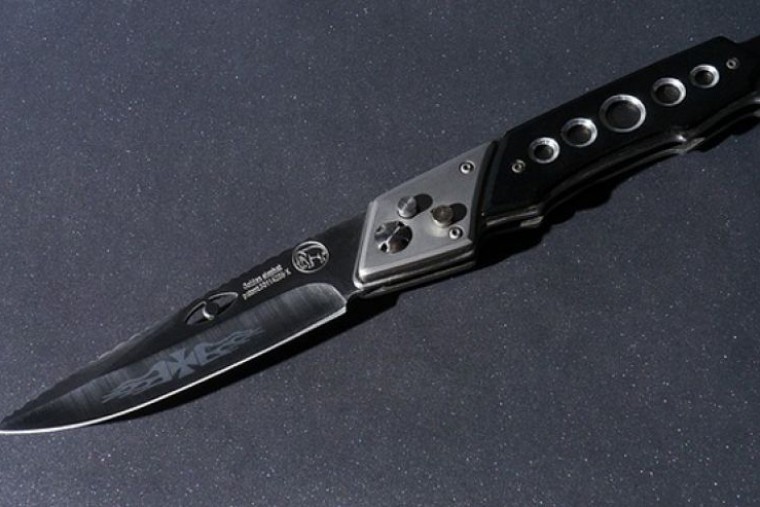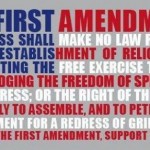
Once overshadowed by the hot-button gun rights debate, laws restricting knife sales and possession are the new “second front” in the battle to preserve Second Amendment rights.
The issue has gained more attention in recent years — most recently in Baltimore, where obscure knife laws have surfaced at the center of the Freddie Gray death case. Well before that case, though, the nonprofit advocacy groupKnife Rights has been steadily working in state capitals across the country to roll back or repeal longstanding knife bans and restrictions.
And they’ve seen a string of successes.
“We’ve introduced the Second Amendment to a significant number of people who never considered it their amendment,” said Doug Ritter, who founded Knife Rights in Arizona in 2009.
The group argues that possessing and carrying any kind of blade is, as with guns, a right enshrined in the Constitution. They’ve deployed that argument to, so far, help 10 states wipe most — if not all — knife restrictions from the books. It also has successfully advocated for so-called preemption laws in eight states, blocking local jurisdictions from circumventing state law with their own, stricter regulations.
Not all repeals are the same — some leave laws against switchblades likestilettos on the books. But others are comprehensive, like in Oklahoma and Maine, which just legalized switchblades, in March and April respectively.
Knife Rights’ first victory was in 2010, when it worked to get all switchblades, dirks and daggers legalized in New Hampshire. Bills in several other states are currently pending.
“There’s no blood running in the streets, no state has come back and said we shouldn’t have done this and tried to reinstate [laws],” Ritter said.
Contrary to the image of gang members carrying butterfly knives to the local rumble, people carry knives for a multitude of reasons, and it is not to maim or kill, Ritter said. “The reality is, millions of Americans use and own knives at home, work, and recreation. But every once in a while someone uses a knife as an arm, to protect the family.”
That’s where the Constitution comes in. “The Second Amendment says ‘the right to bear arms.’ Knife rights are the second front in the defense of our Second Amendment,” Ritter said, noting his group has garnered the support of the National Rifle Association, and employs Todd Rathner, an NRA board member, as its chief lobbyist.
Right now, big retail stores sell a range of blades. However, under arcane existing laws, said Ritter, some of those knives could be deemed illegal, as a series of franchises including Home Depot and Paragon Sporting Goods, found out when they were sued by New York City in 2010.
At the federal level, it is still illegal to send or sell switchblades through the mail or across state lines, though there is no restriction on individual possession. Each state has its own regulations, complicated by varying definitions relating to prohibited items and conceal/carry restrictions. In many cases, state laws conflict with local ones. This can be confusing to knife owners, said Ritter, a point that has been highlighted in the case against the police officers involved in Freddie Gray’s arrest and subsequent death in Baltimore.
Police said Gray was carrying “a spring-assisted, one-hand-operated knife,” which reportedly fits Baltimore’s definition of an illegal switchblade, but does not fit Maryland’s. That’s why Marilyn Mosby, the state’s attorney prosecuting the officers, insists Gray was not carrying an illegal weapon when he was apprehended on April 12.
“Simply carrying a knife in your pocket should not be crime,” said Ritter. But one’s interpretation of what is and what is not an illegal blade could have a major impact on the state’s case. “[This case] has raised awareness about knife rights.”
Jacob Sullum, an editor for Reason magazine, made a similar complaint. “If police and prosecutors cannot agree on whether Gray’s knife was legal, of course, it is hardly fair to expect the average citizen to know, let alone subject him to criminal penalties (a fine up to $500 and up to a year in jail under Baltimore’s ordinance) for guessing wrong,” he wrote on May 6.
Maine State Rep. Joel Stetkis, a Republican, successfully lobbied to pass a law that not only allows for switchblades, but all tools with automatic release, which up until now were banned and getting innocent people into trouble, he says.
“People were having their personal property confiscated and charged with a crime and facing jail time … just for having their pocket knife opening in a certain manner,” Stetkis told FoxNews.com. Even if they were ultimately acquitted, “it’s in the newspaper, and on the Internet … That can actually make a difference of whether someone gets an interview or not [for a job].”
This confusion between switchblades, which have an automatic release, and spring-assisted knives, which do not, led to 60,000 arrests in New York City in 10 years, according to an investigation by the Village Voice, in 2014. There, ordinary pocketknives carried by residents have been deemed as “gravity blades,” or knives that can be opened with a flick of the wrist, and therefore considered switchblades and illegal. In 2010, the city said one-third of homicides in New York were caused by knives.
Knife Rights is currently suing the city because it says the law is unconstitutional. The “wrist flick” test is “not an objective test at all,” said Ritter.
But not everyone supports the movement. Law enforcement groups have weighed in against various bills, especially those that allow people to carry all manner of blades in public. They say switchblades and combat knives have no place on America’s streets.
According to a report by Bloomberg, knives were the second-deadliest weapon behind guns in the U.S. In 2013, 1,500 died from “cutting instruments,” compared with almost 8,500 who died from firearms.
“I’ve seen a lot of deadly attacks with knives and I think repealing all the laws and eliminating them would be ridiculous,” said Jack Rinchich, a retired Florida police chief who now serves as president of the National Association of Chiefs of Police. A Marine Corps veteran who spent 40 years in law enforcement, he is a staunch defender of the Second Amendment.
However, “I do believe we need laws restricting certain types of knives, especially those that are designed to kill,” he told FoxNews.com. “I don’t think anyone should be walking down the street with a combat knife for any reason.”
Chief Sean Mannix, the Texas president of the chiefs’ association, agrees, saying that, “reasonable regulation is okay.”
“I don’t think our society is reflective of one in which the majority wouldn’t be comfortable with people running around with offensive weapons.”
by Kelley Beaucar Vlahos



